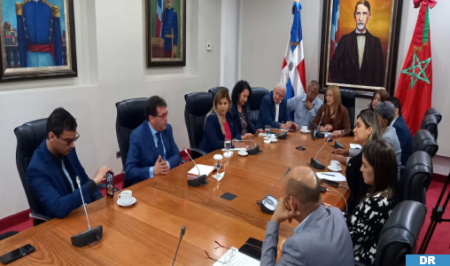Morocco’s USFP Delegation in Latin America to Advocate Parliamentary Cooperation, Moroccan Sahara
Strengthening parliamentary and partisan cooperation and the Moroccan Sahara issue were the focus of the visit of a delegation of members of the Political Bureau of the Socialist Union of Popular Forces (USFP) in several Latin American countries. During this tour, during which the Moroccan delegation visited Colombia, Ecuador and the Dominican Republic, the talks focused on the autonomy initiative in Morocco’s southern provinces, renewable energy and the legalization of cannabis. The USFP delegation included Khaoula Lachgar, Aicha El Karji, Machij El Karkari, members of the Political Bureau, and Ayoub El Hachemi, member of the National Council and coordinator of the Mena-Latina network. In Bogota, capital of Colombia, the delegation held a meeting with Jaime Navarro Wolff, leader of the Green Alliance Party, the largest environmentalist party in South America, Gabriela Posso Restrepo, one of the five senior advisors to the President of the Republic Gustavo Petro, in charge of the youth file and Jaime Jaramillo, Secretary General of the National Council. Jaime Jaramillo, Secretary General of the Liberal Party, the oldest party in the country (174 years) and which has the largest parliamentary group, as well as with academic and civil society actors. During these talks, the delegation made a presentation on the legalization of cannabis, as a national project that aims to support small producers by creating cooperatives dedicated to the exploitation for medical and industrial purposes. The leader of the Colombian Green Alliance party was very interested in the Moroccan experience, calling it a model that could allow Colombia to overcome the scourge of hard drugs and the difficult situation of its farmers. The USFP delegation has also provided its Colombian peers with explanations on the legal and historical aspects of the Moroccan Sahara and the important diplomatic advances made within the framework of international legality, stressing the seriousness of the autonomy proposal in the southern provinces endorsed by the UN bodies. The USFP members, who also exchanged with the head of external relations, Jairo Carillo, and the president of the women’s forum, Jumaira Sarminto, discussed public policies on youth and participatory democracy, partisan and parliamentary cooperation and women’s situation. The meeting was concluded by the signing of a protocol of cooperation and friendship between the two parties. In Ecuador, the USFP delegation went to Quito at the invitation of the Ecuadorian Socialist Party. The visit was marked by the signing of a memorandum of understanding and friendship between the two parties. During this meeting, the USFP delegation highlighted the political and democratic process since the adoption of the 2011 Constitution, the contribution of the Moroccan party and its contribution in the national political life and within international organizations. A presentation was also devoted to the Moroccan Sahara issue, focusing on the autonomy initiative which remains the only viable solution to the artificial regional conflict. Both parties intend to work towards the organization of a joint meeting between the socialist parties of Africa and Latin America, with a view to creating a permanent mechanism for consultation. The Ecuadorian stage of the tour in Latin America was marked by a meeting with the President of the National Electoral Council (electoral authority), Shiram Diana Atamaint, the President of the Council of Multi-identity and Interculturality for Food Sovereignty (in the Ministry of Agriculture and Livestock), Jaime Marchan and the President of the National Assembly (Parliament), Virgilio Saquicela. The talks focused on Morocco’s electoral experience, strengthening parliamentary relations, the Africa-Latin America cooperation and the promotion of human rights. The USFP delegation concluded its tour in the Dominican Republic, where it met with the Deputy Minister of Foreign Affairs, in charge of bilateral relations, José Julio Gomez, member of the Modern Revolutionary Party, who reiterated the support of his country to the Moroccan Sahara. Talks also focused on strengthening political and partisan cooperation and opening new horizons for cooperation and partnership between the two countries, as well as investment opportunities in Morocco’s southern provinces. During its visit to the National Assembly’s headquarters, the delegation held meetings with the Moroccan-Dominican Parliamentary Friendship Group, in the presence of more than 40 deputies, the President of the House of Representatives, Alfredo Pacheco, the President of the Senate, Eduardo Estrella Virella, the leadership of the Dominican Revolutionary Party and the President of the Socialist International Women, Janet Camilo, among others.

